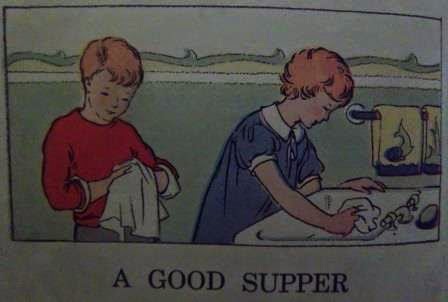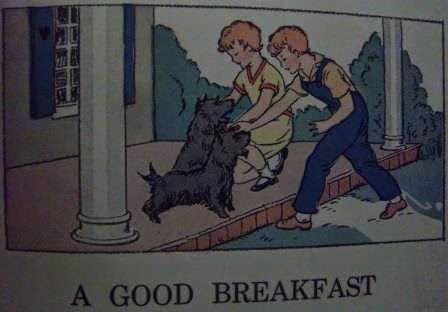Hello! Although I wasn't around in 1936, it would seem to me that the days weren't especially happy that year, what with the ongoing Great Depression and a couple of guys named Hitler and Mussolini acting up over in Europe.
Nevertheless, I came across the 1936 children's book, Happy Days, in a thrift store a couple of days ago and was taken with its charming illustrations. This volume was a little beat up, but for quarter, what do you expect?
It wasn't until I got home and began flipping through some of the pages that I realized that Happy Days had been a textbook for what we'd now call a wellness curriculum. The health teachings of the day were woven into the story of city slicker siblings David and Joan, who spent several days of summer vacation visiting their Aunt Annie and Uncle George.
Naturally, the aunt and uncle live on a farm, which lends itself to many discussions of wholesome foods:
Above, David and Joan are washing their hands before having a "good supper", which consisted of lettuce leaves topped with a tomato with cream cheese, a pile of peas and carrots, and slices of eggs. Brown toast with butter and a dessert of cup custards and little cookies rounded out the meal.
It actually sounds like a pleasant supper for summertime, especially when you consider that they wouldn't have had air conditioning. The only disappointment for David and Joan is that they have to drink milk with the meal, while their aunt and uncle have tea. When David asks why he and his sister can't have tea or coffee, Uncle George sagely replies: "You should not drink tea or coffee...because tea and coffee leave no place in a meal for milk. Tea and coffee will keep you awake when you need sleep and rest. Tea and coffee do nothing to help boys and girls grow or keep well."
Note that Uncle George didn't say anything about carbonated beverages with caffeine in them. David should have asked for a Coke!
After supper, Aunt Annie uses the phrase "Happy day" and Joan wonders about this. Her aunt responds with:
Well, there you have it - Aunt Annie's philosophy, which is a pleasant one, of course. She should have added: "Because when I say 'Happy day', it becomes such a sweet title for this book we're all going to be in!"
The next morning, another nutritious meal awaits them. Pop-Tarts hadn't been invented yet:
Above, David and Joan greet puppies Skippy and Tricksy (the children had been allowed to name them the night before upon their arrival at the farm) after watching their uncle milk a cow. After washing their hands, of course, they drink tomato juice (made from Uncle George's tomatoes), "brown toast and butter, and good fresh milk".
Rather conveniently, I thought, David and Joan go to school one day during their stay, attending with a neighbor's child, Nancy. She explains school days had been lost due to a fire at the old school and the subsequent building of a new school. Thus, the kids had to make up a month of school during the summer.
I think this was just a literary ploy to introduce another wise adult, in the form of Nancy's teacher Miss Long. She instructs a health unit on colds. Kleenex was around, but the students were cautioned to always carry clean handkerchiefs:
Above left, a young girl is taking a clean handkerchief out of the neat stack in a drawer, and on the right, a young boy has a smartly-folded handkerchief in the pocket of his sailor suit.
After school, David and Joan return to the farm and have a snack:
Of course, only natural sugars for these children (Nancy had come with them) - Aunt Annie had a bowl of fruit waiting for them!
After their snack, the children meet up with some kids for:
Some outdoor play. Looks like they're having a boat race in a pond. I don't live near a pond, so I don't know if kids still play in this manner. But I often hear complaints that youngsters today don't play outside enough. Too bad.
The next evening, after a supper of soft-boiled eggs, toast with butter, milk and fruit salad, Aunt Annie tells a story about a young girl who was tardy for everything:
Since we're in the midst of the Tulip Time festival, I thought I'd include this illustration of the girl dashing past some tulips.
Eventually the girl tires of being late for everything, so on her own, she develops a schedule of her daily activities. The new routine included: "Be asleep at eight o'clock at night". I wonder how many kids today would voluntarily make up such a schedule - especially for a rather early bedtime!
It just so happened that David and Joan's birthday fell during their visit, so Aunt Annie and Uncle George help them celebrate. Dinner is another vegetarian entree, peas and carrots with a mashed potato crust (perhaps they only had meat for their noonday dinners?). They do have a birthday cake with ice cream, though - I suppose the occasion was special enough for such rich treats.
For presents, their aunt and uncle give David and Joan Skippy and Tricksy, the puppies. The children are thrilled, but their parents are less so when they arrive to take the kids back home and learn that the puppies are to come with them as well.
David and Joan waste no time trying to assure their dad that they'll take good care of their new pets. Eventually David says something that seems to resonate:
"We will take them out to play every afternoon," said David.
"That will be better than going to the movies," said Father.
"Why?" asked David.
"Because," said Father, "outdoor play helps you grow and keep healthy. The movies do not. Many movies are so exciting that children do not sleep well after them."
Well, there you go, kiddies - if you want a dog and your folks are refusing to get one, just tell them Rover will help you grow and be healthy. And keep you away from ultra-exciting movies as well!
After a glowing report from Aunt Annie concerning David and Joan's health habits during their visit, they begin their trip back to their city home.
And I closed the book on their happy days in 1936.








What a fun "happy" book!
ReplyDeleteit's great, and the pictures are so cute!
ReplyDelete